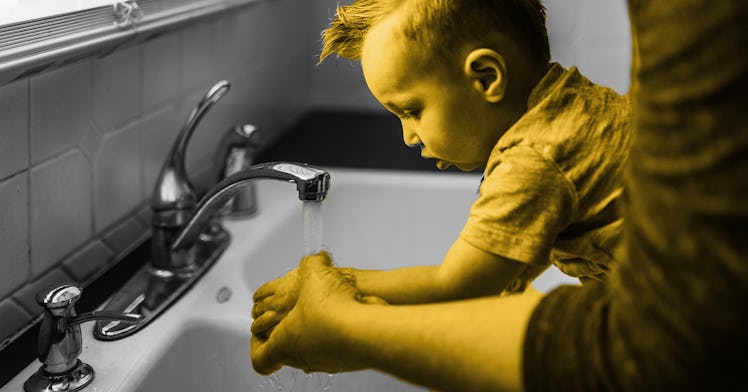3 Ways to Help Prevent the Flu from Spreading in Your House
Kids are really good at spreading germs, but parents can mitigate the risk. Our panel of doctors explain how.

You know when cold and flu season is coming, so why is it so hard to keep those germs away from your child and your home? Probably because colds and flu are passed (very effectively) by hand-to-surface contact, and school-age kids touch everything and everyone. Kids share hugs and crayons and food and personal space, exposing them to pathogens and putting them at risk. Against those odds, disinfecting seems daunting. But the rewards — a healthy, happy family that doesn’t have to miss school or work and avoids costly medical bills — are well worth it.
“You reduce your risk of getting common infections by at least 50 percent if you just follow good hygiene practices,” says Charles Gerba, PhD, an environmental microbiologist at the University of Arizona. “The cost of when a child gets ill is substantial; disinfecting and sanitizing will save you more money than you realize. So it’s good from both a health standpoint and an economic one.”
To help you effectively disinfect your home in order to stop the spread at the first sign of cold or flu, we asked Gerba and Jennifer Trachtenberg, MD, a pediatrician and spokesperson for the American Academy of Pediatrics, for their favorite flu season safety tips.
Flu Season Tip #1: Start With the Hands
Washing hands immediately upon arriving home provides parents with at least some assurance that every dollar, door handle, and phone-distracted pedestrian they brushed up against during the day hasn’t passed along germs to the brassware. Again, the goal can’t be “100 percent germ-free,” but it absolutely can be not living in a viral menagerie.
“We’ve done studies where we’ve put viruses on people’s hands and within four hours of entering their home, it’s on 90 percent of the surfaces they touched,” Gerba says. “Using hand sanitizer and hand washing immediately when coming into the home will reduce a child’s exposure.”
The same is true vice versa. “It’s almost inevitable that parents will get sick from their children,” Trachtenberg says. “That’s why following common sense basics of good handwashing — every time they come home from school, before eating, after using the bathroom — is so important to minimize cold and flu germs in the home.”
Flu Season Tip #2: Disinfect High-Traffic Surfaces
After sufficient hand-washing, parents should unleash their full arsenal of disinfecting products on frequently touched surfaces — and not just the overtly gross ones like changing tables or surfaces where kids throw and mash the food they should be eating.
For example, doorknobs and faucets get touched constantly and should be disinfected accordingly. Toys should be disinfected and then rinsed with potable water to avoid passing germs to other kids, babysitters, and grandparents joining in playtime. Seats must be cleaned (people always forget the furniture) and the bottom of a car seat, in particular, can get super grimy.
Gerba points out helpfully that it’s also key to get the cell phone. Kids love to touch phones. Adults constantly touch phones. Phones are filthy.
Flu Season Tip #3: Embrace the Flu Shot
The problem is, keeping a spotless, sanitized home only gets parents so far. Kids are still gross, and gross kids spend lots of time with other gross kids in close quarters “sneezing, coughing, playing with toys, and touching their noses, mouths, and butts,” Trachtenberg says. “Seventy to eighty percent of surfaces in daycare centers have influenza on them during flu season,” adds Gerba.
Disinfecting will help parents feel better about hanging all those finger paintings on the fridge. Beyond that, parents can mitigate the spread of cold and flu by breaking out the tissues and making sure everyone gets the flu shot.
But, at the end of the day, they have only one path through flu season: the path of pathogenic resistance. Be perpetually prepared to wipe down everything.
This article was originally published on